 When I was a doctoral student, sometime in the late 1980s, I recall Will Oxtoby (d. 2003) — then a professor at the University of Toronto, member of my doctoral supervisory committee and, a few years later, editor of a very popular two volume world religions textbook — saying that theory was like a snowblower (using a suitably northern analogy to make his point); “it helps you to move things around,” he said. Continue reading “Our Primary Expertise”
When I was a doctoral student, sometime in the late 1980s, I recall Will Oxtoby (d. 2003) — then a professor at the University of Toronto, member of my doctoral supervisory committee and, a few years later, editor of a very popular two volume world religions textbook — saying that theory was like a snowblower (using a suitably northern analogy to make his point); “it helps you to move things around,” he said. Continue reading “Our Primary Expertise”
“We Are Canadian, eh?”
 Have you seen this Canadian beer commercial, known as “The Rant”? Airing in 2000, it ran with what was then Molson’s slogan, and was pretty popular in Canada, airing during Saturday night hockey games. In fact, a good friend me a “I am Canadian” key chain back then and I still use–the double entendre of the pithy slogan evident to anyone who knows their brands of Canadian beer. Continue reading ““We Are Canadian, eh?””
Have you seen this Canadian beer commercial, known as “The Rant”? Airing in 2000, it ran with what was then Molson’s slogan, and was pretty popular in Canada, airing during Saturday night hockey games. In fact, a good friend me a “I am Canadian” key chain back then and I still use–the double entendre of the pithy slogan evident to anyone who knows their brands of Canadian beer. Continue reading ““We Are Canadian, eh?””
Forging a Fake
 In honor of one of Culture on the Edge‘s members being in Greece, to do some fieldwork and visit archives, I thought it would be fitting to offer this weekend, public service announcement concerning how to make a fake McDonald’s frappé — which, of course, rivals ouzo as the national drink of Greece. (A frappé, I mean, not a McDonald‘s frappé.) Continue reading “Forging a Fake”
In honor of one of Culture on the Edge‘s members being in Greece, to do some fieldwork and visit archives, I thought it would be fitting to offer this weekend, public service announcement concerning how to make a fake McDonald’s frappé — which, of course, rivals ouzo as the national drink of Greece. (A frappé, I mean, not a McDonald‘s frappé.) Continue reading “Forging a Fake”
Seeing the Ordinary as Curious
Sometime ago, I uploaded to a Facebook album my own version of a Sociological Images post — worth reproducing here, I think: so consider this March 20, 2009, photo of a group of Cameroon’s Baka people performing for Pope Benedict XVI as he left for Angola.
 Simple question: who is wearing a costume?
Simple question: who is wearing a costume?
To rephrase, can you see an ideology to men’s neckties? Why would they have been banned in the 1979 Iranian revolution? Or are they so ordinary, so normal, as to pass unnoticed?
(Admit it: you thought I was just comparing the dancers to the Pontiff, didn’t you?)
The Race Card
Have you seen The Race Card Project online? It is a site that solicits your six words about race, such as:
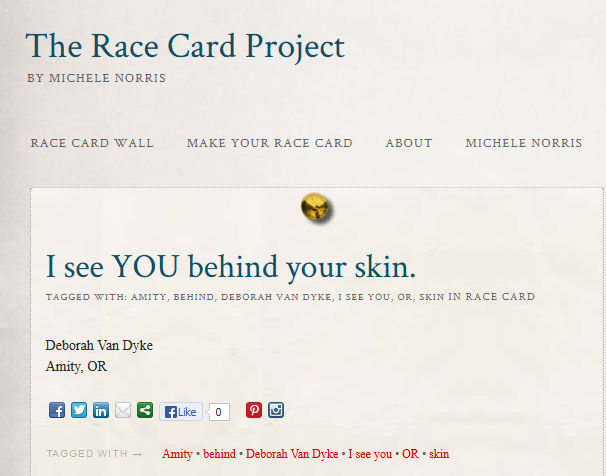
Those interested in considering popular understandings of this one identity domain may find this website to be a rich resource–such as the above sample which presupposes the common notion of a deeper, stable subjectivity that transcends identifiers.
Visit the site here or listen to a National Public Radio segment on it from earlier today.
The Evidence of Experience
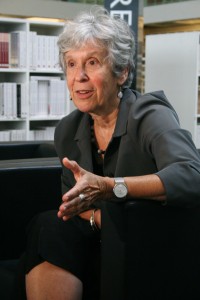 Joan Wallach Scott, the well known historian, wrote a provocative and lengthy essay on the manner in which social historians and many area specialists have mistakenly drawn upon experience as if it was the evidence/starting point for their work (that is, material culture is seen an expression of a prior experience) rather than problematizing how public claims of having had an experience are themselves social and historical products. The essay was published in Critical Inquiry 17/4 (1991): 773-797 and is posted online as a PDF. Those wishing to rethink identity studies will benefit from this essay.
Joan Wallach Scott, the well known historian, wrote a provocative and lengthy essay on the manner in which social historians and many area specialists have mistakenly drawn upon experience as if it was the evidence/starting point for their work (that is, material culture is seen an expression of a prior experience) rather than problematizing how public claims of having had an experience are themselves social and historical products. The essay was published in Critical Inquiry 17/4 (1991): 773-797 and is posted online as a PDF. Those wishing to rethink identity studies will benefit from this essay.
Learn more about Scott’s recent book on the politics of the issue of Muslim women and veils here.
Religion is Nothing Special
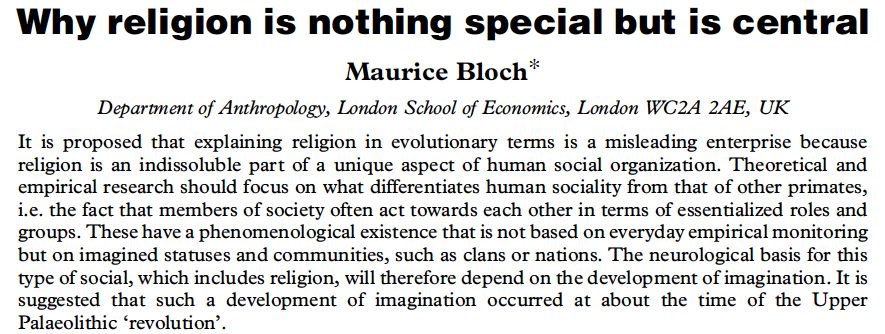 The anthropologist, Maurice Bloch, published an important article in 2008 in Philosophical Transactions of the Royal Society B [Biological Sciences], 363: 2055–2061; critiquing recent energy spent on developing an evolutionary, cognitive science theory of religion, it opens the way toward working not on a theory of religion but, instead, taking that which we normally call religion as but an instance of a wider, mundane, but no less interesting cognitive event that we might simply call signification–which itself ought to be the object of our studies.
The anthropologist, Maurice Bloch, published an important article in 2008 in Philosophical Transactions of the Royal Society B [Biological Sciences], 363: 2055–2061; critiquing recent energy spent on developing an evolutionary, cognitive science theory of religion, it opens the way toward working not on a theory of religion but, instead, taking that which we normally call religion as but an instance of a wider, mundane, but no less interesting cognitive event that we might simply call signification–which itself ought to be the object of our studies.
Obtain a free PDF of the article at the publisher’s website here.
Everything Old is New Again in Thessaloniki
 An interesting video was posted earlier today by the British newspaper The Guardian, a film which is part of the Energy Bits documentary initiative. It is on a very interesting Greek “upcycling” project/business in Thessaloniki, in which found objects (from the garbage or junk yards) are transformed by artists, architects, etc., into rather cool, usable things. Continue reading “Everything Old is New Again in Thessaloniki”
An interesting video was posted earlier today by the British newspaper The Guardian, a film which is part of the Energy Bits documentary initiative. It is on a very interesting Greek “upcycling” project/business in Thessaloniki, in which found objects (from the garbage or junk yards) are transformed by artists, architects, etc., into rather cool, usable things. Continue reading “Everything Old is New Again in Thessaloniki”
The Alchemy of Circumstances
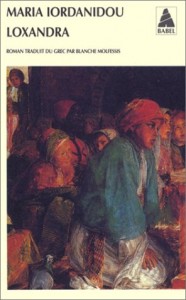 After quoting from Maria Iordanidu‘s novel, Loxandra (c. 1963)–a novel set in the early 19th century in the city then known as Constantinople–concerning an episode in which an otherwise unassuming shopkeeper is questioned by the protagonist as to whether he had participated in the massacre of Armenians–Jean-Francois Bayart goes on: Continue reading “The Alchemy of Circumstances”
After quoting from Maria Iordanidu‘s novel, Loxandra (c. 1963)–a novel set in the early 19th century in the city then known as Constantinople–concerning an episode in which an otherwise unassuming shopkeeper is questioned by the protagonist as to whether he had participated in the massacre of Armenians–Jean-Francois Bayart goes on: Continue reading “The Alchemy of Circumstances”

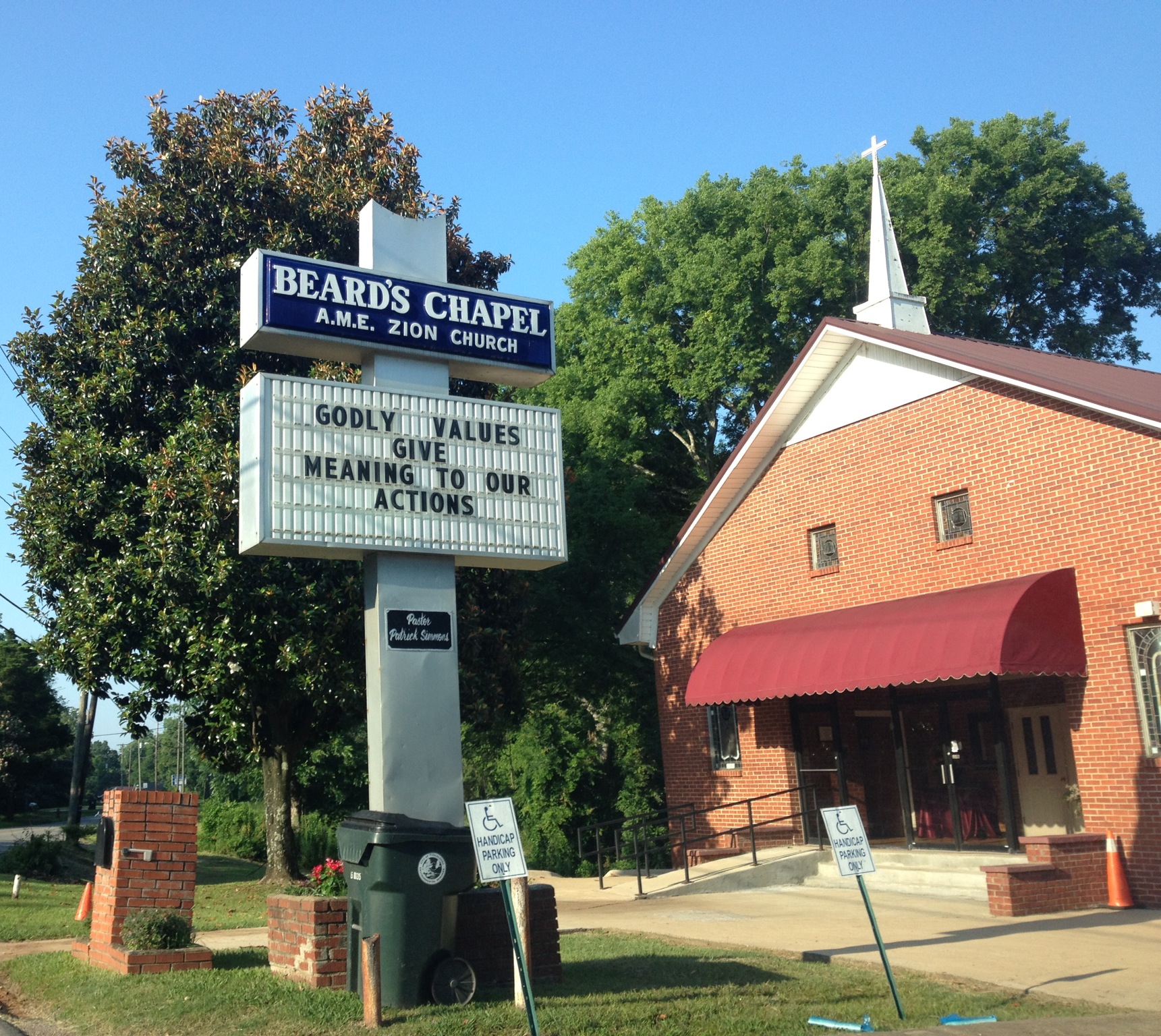 It’s sort of interesting to see how an apparently counter-intuitive model of identity uncontroversially (and probably unintentionally) finds its way into everyday life.
It’s sort of interesting to see how an apparently counter-intuitive model of identity uncontroversially (and probably unintentionally) finds its way into everyday life.